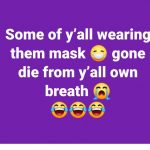Exposing Black Male Privilege
Physical Safety
85. I do not have to worry about being considered a traitor to my race if I call the police on a member of the opposite sex.
86. I have the privilege of knowing men who are physically or sexually abusive to women and yet I still call them friends.
87. I can video tape women in public- often without their consent – with male complicity.
88. I can be courteous to a person of the opposite sex that I do not know and say “Hello” or “Hi” and not fear that it will be taken as a come-on or fear being stalked because of it.
89. I can use physical violence or the threat of physical violence to get what I want when other tactics fail in a relationship.
90. If I get into a physical altercation with a person of the opposite sex, I will most likely be able to impose my will physically on that person.
91. I can go to parades or other public events and not worry about being physically and sexually molested by persons of the opposite sex.
92. I can touch and physically grope women’s bodies in public- often without their consent- with male complicity.
93. In general, I have the freedom to travel in the night without fear.
94. I am able to be out in public without fear of being sexually harassed by individuals or groups of the opposite sex.
Background:
The Black Male Privileges Checklist was born out of years of organizing men’s groups and the numerous — often heated — conversations I have had with men while utilizing Barry Deutsch’s The Male Privilege Checklist. In my experiences, most men would object to at least some items on the Male Privilege Checklist. However, “men of color”, and especially African American men, often had the sharpest criticisms of the Male Privilege Checklist and the most problems relating to the idea of male privilege.
There are many reasons why black men would be reluctant to identify with the concept of male privilege. One of the most important reasons is that our experience with privilege is based on a history of political, economic, and military power that whites have historically exercised over black life. This conceptualization of privilege has not allowed us to see ourselves with privilege because the focus has been placed largely on whites. Privilege is not restricted to economic, political, or military areas of life. Privilege is also social, cultural, sexual, institutional, and interpersonal in nature. Our inability to have a more expansive understanding of privilege and power has foreclosed important insights into virtually every aspect of black men’s lives and other “men of color”.
As black men, we have also been skeptical of pro-feminist males, most of whom were white and middle class. Black men who fought for freedom during the Civil Rights Movement and the Black Power Movements were suspicious- to say the least- of the motives of white men who were requesting that black men give up the privilege they never felt they had. Given the timing of the pro-feminist male movement and the demographics of these men, it has not been easy to separate the message from the messenger. Black men had a similar reaction to the voices of black feminists, who we saw as being influenced by white middle class feminists. Alongside this, there has long been a belief among many black men that racism provides privileges to black women that are denied to black men.
In addition, many of the items on The Male Privilege Checklist simply did not to apply to black men and other men of color. As a result, many black men argued that the list should have been called The White Male Privilege Checklist. In light of these considerations, the Black Male Privileges Checklist differs from the Male Privilege Checklist in several respects.
First, It departs from an “either/or” view of privilege that suggests that an individual or a group can only be placed into one category. Therefore, the focus is on privileges and not privilege. It also highlights belief systems that often serve as the basis for justifications and rationalizations of exploitation and discrimination.
Second, The Black Male Privilege Checklist takes a Life Course perspective, acknowledging the fact that privilege takes on different forms at various points in men’s lives.
Third, it takes a Global perspective to highlight the privilege that black males have as Americans, and the privileges black men share with other men of color. African American men rarely acknowledge the privilege we have in relationship to people in developing countries — especially women. Too often, our conception of privilege is limited to white men and does not lead us to reflect on the power that men of color in Africa, Asia, and Latin America exercise over women. Finally, it calls for action and not just awareness. We need “men of color” to be actively involved in social welfare and social justice movements.
Invariably, the Black Male Privileges Checklist will inspire some men to create their own list describing the list of privileges they believe black women benefit from. What men need to understand is that paying attention to male privilege does not mean that women are without faults. Rather, it means that black men cannot be blind to the facts that black men earn more than black women do, black men continue to dominate most of the political, religious, and cultural institutions within the black community, and that black men continue to dominate black women in areas of physical and sexual abuse.
As “men of color”, we have a responsibility to acknowledge that we participate in this system even though it offers us little rewards. Most African Americans, for example, take for granted the system of capitalism that we all participate in, even though we know that it does not offer us the same rewards that it does for whites. The sex-gender system, which privileges men over women, operates in similar way for all men. Black men and other “men of color” can participate in this system even though it does not offer similar rewards.
Finally, the Black Male Privileges Checklist is a tool that can be used by any individual, group, organization, family, or community that is interested in black males having greater insight into their individual lives and the collective lives of black women and girls. It is also a living tool that will grow and be amended as more discussion and dialogue occurs. This is the first edition of the Black Male Privileges Checklist and will be updated regularly. This checklist was created with black men in mind, and does not necessarily capture the experiences and cultural references of other ethnic males. I would welcome dialogue with others who are concerned about these constituencies as well.
Category: Men's Issues




















Razzy AnthonyBlakMartianTinney If you don`t like the advice someone is trying to “SELL” you,DON`T BUY IT,DON`T LISTEN TO IT!!! You do have freedom of choice after all
@Guapo1492 It’s all relative. Privileged in relation to whom?
I have a solution for ALL black women.If black men are so bad……..LEAVE THEM ALONE!!! Problem solved.It`s not my obligation as a black man to morph myself into ANYONES` version of who they think i`m suppose to be.Live your life,Stop trying to live MINE.
AnthonyBlakMartianTinney
Black men need to stop expecting black women to morph themselves into what they want them to be as well. Look at all these black men out there like Steve Harvey and others all up on black women’s tip telling them how to get and keep a man. Yet when you get similiar message you don’t want to hear it.
I found my way to this blog by Google happenstance. After careful consideration I regard this list of black male “privilege” as an anachronistic litany of gynocentric stereotypes. Perhaps not all are specious but that’s moot since given the hardship that black men endure in this society, the prospect of having any kind of relationship with a women who thinks we enjoy “privilege” in relationship to them is unattractive. I do wish you and others of your ideology well though since I acknowledge that black women have a hard time of it in our society and deserve better. If such privilege were to exist the more natural couplings would be between black men with white women and black women with asian men so as to avoid exploiter with exploitee pairings.
Brian“After careful consideration I regard this list of black male “privilege” as an anachronistic litany of gynocentric stereotypes. Perhaps not all are specious but that’s moot since given the hardship that black men endure in this society, the prospect of having any kind of relationship with a women who thinks we enjoy “privilege” in relationship to them is unattractive”
Another dude sounding like Oswald Bates but clearly has no clue what he’s talking about since his comments shows a marked lack of reading comprehension skills and the inability to make intelligent inferences based on what he’s read.
You are under the erroneous belief that the black man’s plight in life makes him immune to enjoying ‘male privilege with regards to male/female relationships. These are 2 different things. And since you’re too dumb to comprehend what you’ve read even though Ms. Cooper and Brother Jewel Woods broke it down to you with the Black Male Privilege checklist, nothing else I say will enlighten you. You don’t want to understand and you are in denial that this exists.
Yet all day long you would understand white privilege when it means your azz is being mistreated by white folks, but when it comes to black men having the upper hand and mistreating black women, suddenly you become obtuse. Meanwhile everyday thousands of black women and children suffer abuse from your marked unwillingness to understand black male privilege gown awry and black women suffering from it. FOH with that BS. You need to go back to school and learn understanding instead of how to make verbose statements that really show how stubborn and ignorant you are and your inability to get over your defensiveness and realize that black males do have and exert privilege when it comes to black women in this country.
Didn’t know being a black male in America granted us any privileges.
Very good article. It just blows my mind that in this patriarchal society men try to put blame women arguing that we’re the victims, when we’ve got so much male privilige. I know that a lot of black men resent black women because the women are typically more successful, better educated than they are. They look at the fact that black girls and women are doing better than they are in school and far more black women are graduating college than black men. I think a lot of these men assumed that they would be able to get a good job without a college degree, just because they are men. But now men are blaming women and feminism claiming that they are the ones holding men back and make college a bad place for black men to be. They are arguing that the colleges have become more feminized and that placements test, teachers, administrators, favor female qualities and people than male. Of course this is rediculous, and the fact is, the most qualified people applying for college are women and it’s women that are going to college in droves and it’s women that are giving everything to obtain their degree. Even overcoming male privilage in college, where women maybe discouraged from pursuing more male dominated courses in math, engineering, etc. Instead of celebrating how successful and smart are women are, we are belittling them, complaining and resenting them for being so successful. We resent them for being successful while were the ones that dropped out or decided not to go to college at all and are now broke. This is how I felt when I married my wife and she went on to finish school and get her degree. Instead of celebrating her success, I was fool and resented it. I resented it because she made more money than I did and was much more successful. It wasn’t until later that I realized that she’s only pursuing what she wants and I should be celebrating and encouraging her instead of putting her down. She did nothing to pull me back. It was my own decision to drop out of college. No women made me do, it I did it on my own because I thought partying and screwing around was a lot more fun. We men need to stop blaming women for our own failures. Women are finally rising up, after years of not being allowed in school or being discouraged from higher education and they are pursuing their dreams to become doctors, lawyers, dentists, nurses, etc. and who are we as men to fault them for doing so? We should be encouraging and celebrating their success. If we as men are to lazy to figure out what we want to do with our lives than it’s our own fault
This isn’t Black male specific. Several men of all races and cultures use this behavior. Also if women do go for it, it doesn’t happen bottom line. I remember as teen in NY black females were less likely to talk to you unless you had flashy things or were aggressive. Again I say “IF WOMEN DON’T GO FOR IT, IT WON’T HAPPEN”
This places control of what men do on women. Not working for me. Men need to get their shit together and do what they are going to do to be the best men possible. If they don’t, and their mother wasn’t successful at it, then it is not their date’s job to raise them and mature them.
greatly detailed and informative column, and I would say substitute any other men of color and the same exact privilege apply….but since this is about black men, I’ll keep it there.
ps. I love how you respond to trolls, hysterical.
If’n it was a Black Male privledge explain, Racial Profiling, Amadou Diallo, and many other unfair things that have happened to the Black man, You can’t hold all Black men responsible for the terrible things these fools have done. Blame those commercials that tell you how you need to be seen, or the Videos telling them how to step to sistas, not us. and let the truth be told it has Been Black women that have done terrible things including Child molestation, and get people murdered We all need work. But again it’s one-sided.
You miss the entire point. The issue with privilege and black men has nothing to do with Whites, it has to do with how you all treat Black women!!! The treatment of Black women, the attitudes of superiority, the belief that you have rights to shout at us on the street, demand that we “smile” when you say so, and talk to you when you want us to, that we not make more money than you or we are “emasculating” you as well as the blame you place on us for single parent homes when it takes two to create a child are prime examples of the Black Male Privilege at work.
The fact that you could sit here and try to blame child molesting on women when it is MEN that promote child pornography, molest their step daughters and step sons, and their own children and their relatives, rape Black women in packs like its a damn sport or something, slap punch and beat Black women, kill Black women and give Black women drugs to get them hooked so you will have even MORE control … talk about that why don’t you?
I no miss the whole entire point. I hear what you sayin’ but you not hearin’ me. There ain’t no such thing as Black Man priviligde if it was you wouldn’t be writing this. I was making a general point. All behavior is learned Male and Female. And it’s cat calls in all backgrounds and it’s not all men that do that, I don’t. and many that have common sense don’t. It’s these knuckleheads that do all that good stuff everything from Honk the horn, yell across the street with phrases such as Hey Ma’, and Yo Shawty that women from all backgrounds especially sisters respond to. True it takes two to make a baby, problem is that baby suffers once it’s born to parents that won’t see eye-to-eye for the child’s sake, and family, also the irresponsiblity of both people when all they wanted to do is bone each other. Mostly all of what you talked about again goes back to slavery and it was passed down and passed on to all races let alone mental disorders as well that most people after finding out the crime they did had psychological issues to begin with. So when you make blank rants like that look at it from all angles and in case you dinna know this what Real Men do they best to prevent Niggas or anyother Man or woman from doing to anybody I talk about it, and I do something about it. Let’s see some action from you.
Danta: “and it’s not all men that do that, I don’t. and many that have common sense don’t. It’s these knuckleheads that do all that good stuff everything from Honk the horn, yell across the street with phrases such as Hey Ma’, and Yo Shawty…”
Danta, if you don’t do this sort of thing, why are you taking it so personal as if this message applies to you? And just because you claim this isn’t something that you do, doesn’t mean that the issue should be ignored and not discussed talked about by sisters who are on the receiving end of unwanted catcalls and behaviors by the ‘knuckleheads that do this. You’re talking out of both sides of your neck. One the one hand you say, ‘you don’t do this behavior’ but then you agree that this behavior exists by knuckleheads’. You don’t know what women want or don’t want. Often women respond just to get the clown off their back so they can go about their business. You also fail to realize that often women are raised to ‘not say no’ to a man which is another part of ‘male privilege’. http://survivingdating.com/when-he-wont-take-no-for-an-answer It’s hard for you as a male to recognize and acknowledge black male privilege just as it is hard for a white man to acknowledge and recognize ‘white male privilege. Those who are in power have a hard time stepping outside of their place of power to see the other side of it from those who have to ‘deal’ with ‘their’ power’. Just because you don’t ‘get black male privilege’ doesn’t mean you should dismiss it anymore than a white man should dismiss’ white male privilege because he’s not a victim of it. However Danta, if these posts don’t apply to you, why do you feel the need to act as if they do and defend’ yourself? You don’t represent all the other black males in this world.
Raz, Raz, Raz It’s alot of justification your writings, you hate it but you give it a pass at the same time. Your Doubletalkin’ skills are astounding, downright incredible,incomporable, I’ll even go as far enough to say: Swell.
and How can I talk outta both sides of my neck? Wouldn’t that make me Fish or Merman? Where I take issue is I as well as many other I ain’t gonna say nice But Down-To-Earth brothers that get lumped in the catergory of the knucklehead behavior you speak of because we are the same gender. I acknowlegde all of this exists, I get mad when y’all fall for it and by into it. Down-To-Earth brothas ain’t gonna approach nobody like that, the knuckleheads do it because they know you will respond. You can just go about your business or say you not on that, and any dude that respects women will honor that. The knuckleheads that don’t take no for an answer ususally get the Girl I seen this happen when he will pull up, ask what she or a group of females on, the knucklehead will say something that she will like and either give her info to him, or get in the car right then and there! You can’t dispute it because I know you seen it happen as well. When he won’t take no for an answer it’s like a twisted sense of persisitance and the female goes for it. If’n you really read anything I wrote you will see that I said females that like, or knuckleheads that is I don’t lump all into a catergory that’s unfair, it ain’t right. And like you said it doesn’t speak for everybody. I rep the silent majority those out there being good people, and dating responsibly the ones that Folk like the knuckleheads and women that think they too good for everybody says are lames, or believe we don’t exist. I feel passionate when anybody is attacked and they are not personally responsible. So as you say these things look from all angles it’s good and bad in everything and everyone, Black men on that tip of doin’ trifling, horrible things believe they can get away with it, women on that the same way too. Look at it from all angles it will broaden your understanding, and possibly have you come up with some solutions as well.
Negro, you don’t tell me what to write or how to write it on MY blog! If you don’t like what I write, then go elsewhere. I started this blog to post MY thoughts, and yours are totally irrelevant. I suggest you start your own blog. You can do it free all over the web. But I pay for this site, I pay for the bandwidth, and I pay for the images, and I write the content. It says what I want it to say and it looks the way I want it to look.
As for your excuses, they are silly. I would never blame people acting a fool in 2010 on what happened 500 years ago. That is a weak ass cop out and something people with low self esteem always seek to do – blame.
Check this out homie, people make babies and that is what they want to do. I don’t have to like it and neither do you, but you ranting and raving about women like they have tails is not going to change anything. Haven’t you heard the phrase “you get more bees with honey than vinegar?”
You and men like you spew vinegar and toxic acid at women and think someone is going to listen to you or take your ass seriously!? Think again!
Deborrah: “ranting and raving about women like they have tails is not going to change anything. Haven’t you heard the phrase “you get more bees with honey than vinegar?”You and men like you spew vinegar and toxic acid at women and think someone is going to listen to you or take your ass seriously!? Think again!”
Which is why a lot of males who spend an inordinate amount of time putting down women in cyberspace, spend much of their time, in cyberspace on blogs instead of in the arms of a woman in real life. The only closeness they get is through interacting with women on cyberspace lol.
Other interesting links on Black Male Privilege:
Yes Virginia, There is Black Male Privilege, by L’Heureux Dumi Lewis
An Answer to Black Male Privilege, by Dr. Lester K. Spence
Wishing you all progress …